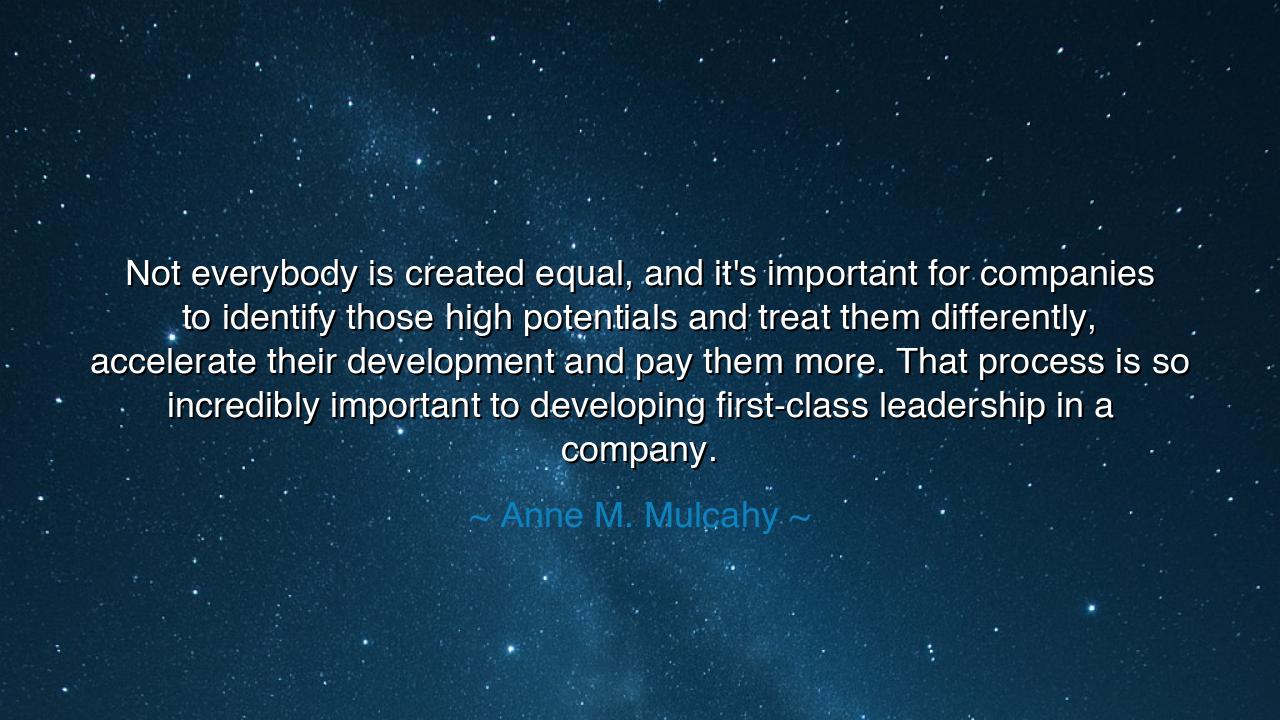
Not everybody is created equal, and it's important for companies
Not everybody is created equal, and it's important for companies to identify those high potentials and treat them differently, accelerate their development and pay them more. That process is so incredibly important to developing first-class leadership in a company.






When Anne M. Mulcahy, the transformative former CEO of Xerox, declared, “Not everybody is created equal, and it's important for companies to identify those high potentials and treat them differently, accelerate their development and pay them more. That process is so incredibly important to developing first-class leadership in a company,” she spoke with the voice of a leader who had faced both the collapse and resurrection of an empire. Her words carry the tone of one who has looked upon chaos and understood that greatness — whether in nations or in companies — is not born from equality of ability, but from equality of opportunity and the wisdom to cultivate excellence wherever it appears. She was not denying the worth of all, but calling attention to a truth as old as civilization: that progress demands the recognition of exceptional potential, and the courage to nurture it for the good of all.
The origin of this quote lies in Mulcahy’s time at Xerox Corporation, a company once on the brink of collapse in the early 2000s. When she assumed leadership, Xerox was billions in debt and bleeding from within — demoralized, fragmented, and unsure of its future. Yet Mulcahy, through clarity of vision and deep understanding of people, began to rebuild it from the inside out. She realized that no company can rise through systems alone; it rises through people — through those rare individuals whose capacity, commitment, and creativity exceed ordinary limits. In this crucible of crisis, she learned what every wise leader eventually learns: that the greatest duty of leadership is to find and empower other leaders.
When she says, “Not everybody is created equal,” she speaks not of inequality in worth, but of diversity in potential. The ancients, too, understood this principle. The philosopher-king Plato, in his vision of the Republic, wrote that a just society must recognize the golden souls among its citizens — those capable of greater understanding and stewardship — and entrust them with leadership for the common good. Mulcahy echoes this timeless wisdom in modern form. For to treat all identically in a world of unequal gifts is not justice; it is blindness. The wise leader does not favor unfairly, but discerns rightly, seeing in each individual the seed of their highest contribution and giving it the soil to grow.
In her belief that “high potentials” must be treated differently and developed swiftly, Mulcahy captures the essence of strategic mentorship — the art of accelerating excellence. A company that refuses to recognize and invest in its most capable people dooms itself to mediocrity. The ancients trained their warriors, scholars, and statesmen with rigorous care because they understood that the strength of a nation rested upon its elite — not of privilege, but of preparation. Likewise, Mulcahy’s approach to corporate leadership is not elitism, but stewardship: the responsibility to refine raw brilliance into guiding light.
Her philosophy can be seen mirrored in the history of Xerox’s own transformation. When she took over, Mulcahy sought out individuals within the organization who still believed, who still possessed the fire to innovate and rebuild. She placed trust in them, gave them freedom, and rewarded their faithfulness. Under her leadership, these “high potentials” became the pillars of Xerox’s renewal. She knew that morale could not be restored by speeches alone, but by creating a culture where merit was recognized and rewarded, where excellence inspired others to rise. From those few, strength spread to the many — until the company once again stood on solid ground.
Mulcahy’s insight that “this process is so incredibly important to developing first-class leadership” speaks to the heart of every institution, whether a business, a family, or a nation. Leadership begets leadership. A wise leader does not merely manage; they multiply. By nurturing potential, by trusting talent, they create a legacy of capability that outlives their tenure. The mediocre leader fears the brilliant subordinate; the great leader cultivates them, knowing that their own greatness lies in the success of those who follow. It is this humility and foresight that transform organizations into dynasties and names into legends.
The lesson of Mulcahy’s words is both moral and practical: recognize, nurture, and reward excellence. Seek out those whose hearts burn with purpose, whose minds are alive with curiosity, whose integrity is unshakable — and invest in them. Create systems that elevate potential rather than suppress it, and build environments where ambition is not punished, but refined. And for those who would lead, understand this: greatness is not inherited — it is awakened by those who see it before others do.
So let her wisdom be carried forward as a principle for all generations: treat every person with respect, but not every person the same. See in each the difference that makes them valuable, and cultivate it for the good of all. For it is through the elevation of the exceptional that the whole is lifted higher — just as a single flame, when protected and fed, can light the fires of an entire city. And thus, through vision, discernment, and courage, first-class leadership is born — not by chance, but by the deliberate shaping of human potential into power.






AAdministratorAdministrator
Welcome, honored guests. Please leave a comment, we will respond soon